BACKGROUND
The Government of Guinea’s Ministry of Health National Health Development Plan (PNDS), 2015-2024, characterizes Guinea’s health system as being weak. It describes the country’s health challenges as follows: morbidity and mortality levels are still too high, especially among vulnerable groups, including mothers and newborns; weak coverage for most of the essential health services and the doubtful quality of those services; inefficient and inequitable provision of health services; and an operational environment constrained by important obstacles and constraints, notably in the areas of adequate equipment and infrastructure. It notes this environment was worsened by the 2014-2016 Ebola outbreak. The health system is still recovering from the devastating impact of this epidemic.
GOALS
The “Our Health” activity aims to bring accessible, affordable, and high-quality health care to Guinea. It will contribute to improving the health of vulnerable Guineans, especially women and children, through a wider rollout of an equitable and integrated health program.
“Our Health” activity will work in partnership with the Ministry of Health and Public Hygiene and its partners, through its programs and national departments involved, but also with many public and private technical and financial partners who are active in the health sector and involved in the socio-economic development of Guinea. It will cover the fifteen prefectures of the regions of Labé, Boké and Kindia as well as the six communes of the city of Conakry.
ANTICIPATED RESULTS
The activity aims to achieve the following objectives in the communities and local health facilities supported by USAID:
- Evidence of improved governance practices of prefectural health authorities and health service providers.
- Increased improvement in the accessibility of quality health services in USAID-supported geographic zones.
- Clients and citizens report improved satisfaction with the health services they receive.
- Health service delivery points report increased use of essential services; and
- Civil Society Organizations and Faith-Based Organizations provide increased oversight of local health services.

